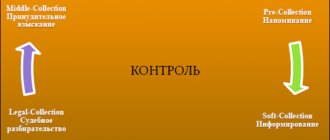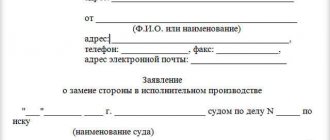A person found guilty by a court of failure to fulfill financial obligations (debtor) is obliged to compensate for the damage caused or repay the outstanding debt, regardless of what social group he belongs to. Often the role of debtors ends up being pensioners who took out loans or borrowings from the MFC and were unable to assess their solvency. The only source of income for many of them is a pension.
This article will discuss how penalties are withheld under writs of execution (IL) from pensions, what benefits and concessions pensioners have, the amount of deduction from pensions under writs of execution, and how to appeal the actions of bailiffs.
The procedure for collecting debt from a pensioner
The main regulatory act regulating the procedure for bailiffs to execute court decisions is Federal Law-229 “On Enforcement Proceedings”. If the bailiff receives an IL for a pensioner, with an informal approach to the performance of duties, the bailiff is obliged to check what category the debtor’s accounts belong to and whether they are subject to collection of funds. In practice, the FSSP has long abandoned its obligations to verify the seizure and seizure of citizens’ accounts, arguing that its employees are “busy.” Penalties are imposed on all identified sources of income, regardless of whether deductions can be made from them or not. The burden of appealing the actions of the bailiffs is placed on the debtors. Due to the fact that many pensioners are not able, for a number of reasons, to independently appeal the illegality of the actions of the bailiffs, they find themselves without a livelihood.
Only in the 22nd year of the existence of the FSSP and the bacchanalia, when the state with one hand bestows special payments and benefits on pensioners that are not subject to recovery under the IL, and with the other (bailiffs) confiscates them, a solution was found. As always, it’s elementary simple. Mark incoming funds with a special marker (code), which allows you to determine whether collection can be imposed on these funds or not.
The procedure for collecting debt under IL is no different from that for other categories of citizens. Since marking payments with markers becomes mandatory as of June 1, 2020, bailiffs do not need to find out whether or not they can seize income. The executor of the bailiff's order - the credit institution - will independently determine whether the funds are subject to withholding or whether they are marked with a marker that they cannot be transferred to the creditor for debts.
Is it possible to protect your money?
Even in a situation where debt exists, citizens still think about how they can insure themselves. In this context of the problem, it is important to understand that you cannot avoid interacting with bailiffs. We will describe the general state of affairs and nuances below.
General information
We repeat: it is extremely important to notify the bailiffs about the intended purpose of the account
, which receives pension accruals. A citizen should note that the existing pension is his only source of income. If this is not done, all benefits will be seized. The bailiffs will simply consider the debtor’s inaction as confirmation of the fact that he has other sources of cash income.
An account statement must be attached to the application: it must contain the seal of the banking company and the signature of the responsible official.
All this is necessary only so that, in accordance with the requirements of the law, the bailiff issues a resolution to reduce the amount of the penalty. The reduction can be 30–100 percent (again, depending on the amount of the pension).
Note 6.
If a citizen has dependent children or relatives who have the status of incapacitated, seizure will most likely be imposed on no more than 30% of pension payments.
Bailiffs are still confiscating your entire pension - what to do?
If the borrower sent a notification to the bailiffs, but it was ignored, and 100% of payments are still withheld from the benefit, this is a serious reason to contact the Chief Bailiff of the FSSP with a complaint. An alternative is to contact the prosecutor's office.
If the first option is chosen, the complaint should be sent to the responsible employee of the structure who controls the activities of specialists involved in collecting money from unscrupulous borrowers. And again, we must not forget about the documents confirming the intended purpose of the account.
If the second option is chosen, then there is no need to select a specific official. The complaint is simply sent to the authority. However, proof of retirement account designation must still be available.
Debt collection practice suggests that such complaints are usually satisfied.
An exception may arise if a citizen accidentally discloses alternative sources of income (other than a pension). This is, for example, wages from official and/or unofficial jobs, systematic financial assistance from relatives, etc.
Important! Before filing an application and sending a complaint, it is highly recommended to make sure that the document does not contain any information about additional sources of income. If the bailiffs believe that the citizen is provided with other monetary income, it will not be possible to reduce the penalty.
The main advice comes down to this: you cannot be idle. You should not give government agencies a reason to believe that the borrower is doing well and is not interested in reducing the amount of funds withdrawn. The law allows you to achieve some relaxations - it’s worth taking advantage of it.
Every citizen should study for himself the Federal Law “On Enforcement Proceedings” dated October 2, 2007 No. 229-FZ. It will help you properly deal with the situation when it comes to the threat of seizure of your pension or imposition of penalties.
What can be the basis for arresting a pension?
Seizure of money in accounts is a favorite measure of enforcement of a court decision among bailiffs. It does not require any active action. Based on a pre-compiled list, a resolution to seize accounts is sent to all banks. Accounts are frozen on the basis of Art. 70 FZ-229.
In addition to bailiffs, pensions can be seized and withheld by decision of the tax authorities if the pensioner has incurred a large tax debt, or reports on the activities of the individual entrepreneur have not been filed in a timely manner. Tax authorities have the right to extrajudicially write off funds from the accounts of debtors. Regarding the size, the same rules apply as those established for judicial proceedings: the total amount of write-off should not exceed 50% of the income from which collections can be made. In exceptional cases listed in Part 3 of Art. 99 FZ-229.
The law does not provide for other grounds for deductions from pensions.
Deduction amount
A citizen of retirement age cannot be deprived of a source of income by a writ of execution or a court decision.
The state allows only up to 50% to be withheld from this source of income. Deduction is made from the insurance pension. If the recovery is made by decision of the Pension Fund, which previously transferred excess amounts to pensions, no more than a fifth of the pension payments are withheld.
But 70% can be withheld from the pension if we are talking about a debt related to compensation for injury to health, with damage as a result of a criminal offense.
Collection of debts from pensions from June 1, 2021
The catastrophic decline in household incomes, aggravated by the introduction of prohibitive measures related to the emergence of the new COVID-19 virus, has raised the question of the survival of the most vulnerable and weakly protected categories of citizens: children and pensioners. If the Government of the Russian Federation is taking some measures in relation to children, then in relation to people who are unable to work due to their age, “except for increasing their retirement age,” the state does not help in any way. To minimize the absurdity of the situation when a pensioner is paid a state benefit that is not subject to seizure, and the bailiffs immediately confiscate it, Federal Law No. 14 came into force on June 1, 2020.
The main innovation of the new law was the ability to distinguish money received into an account by marking it with a special code.
Site Expert
Fasakhovva Elena Alexandrovna
Member of the Russian State Duma Committee on Non-Bank Credit Institutions. Has been involved in bankruptcy proceedings since 2015.
Ask a Question
From now on, the pensioner will no longer have to write a statement to the negligent bailiff who seized his account, prove that the funds were written off illegally, and then wait several months until they are deigned to return them. This could and should have been done 20 years ago. No one will return the huge amount of funds illegally written off from pensioners. Either because the injured debtor himself does not apply to the FSSP, or because the statute of limitations has expired (3 years).
Another innovation is the exemption from collection of lump sum payments in the event of loss of property or damage as a result of emergency situations. Applies to payments received as compensation for the death of dependent family members.
Results
All pensions that retirees receive are income.
However, state pensions are not subject to personal income tax, and only pensions, payments of which are made by non-state funds, are subject to taxation. Thus, if a non-working pensioner decides to take advantage, for example, of a property deduction for personal income tax, he will be able to do this if, before the right to the deduction arose, he received taxable income during the three previous years or receives a non-state pension. You can find more complete information on the topic in ConsultantPlus. Free trial access to the system for 2 days.
What types of pensions cannot be seized?
The State Duma of the Russian Federation, which has been simulating work for decades, has included in the Federal Law No. 14 the list of funds received in the event of the loss of a breadwinner. The meaning of the innovation is clear only to “legislators”, since such a prohibition has long been contained in clauses 2 and 10 of Art. 101 FZ-229.
The full list of 19 points is contained in Art. 101 FZ-229.
The previously existing list of funds not subject to seizure was supplemented in 2020 with two items:
It is prohibited to withhold debts or funds to compensate for damage, as well as arrears of alimony from money paid to victims during emergencies (from lump sum payments), as well as from lump sum payments in the amount of 10,000 rubles paid under Decree of the President of the Russian Federation No. 249. Last paragraph - the height of absurdity! It is not clear why it was necessary to make changes to the fundamental law regulating the activities of the FSSP for the sake of a one-time payment? Reflect that this payment is not subject to the provisions of Art. 99 FZ-229, it was possible in the decree itself.
Hotline for citizen consultations: 8-804-333-70-30
Main content of changes
The meaning of the amendments is that from June 1, 2021, employers and banks will be required, when transferring funds withheld from citizens, to indicate a special code in payment documents, with which it will be possible to determine the type of income.
The main purpose of the law is to establish a new procedure for transferring money collected from debtors, indicating codes for the type of income in order to ensure the protection of funds not taken into account when carrying out forced collection.
How can a pensioner minimize the amount of recovery?
According to Rosstat, the average pension in Russia in 2021 is 16,400 rubles. The desire for “averaged” data is not accidental. It is designed to hide the true situation with pension provision. It is not published anywhere what the percentage of citizens receiving the minimum pension is, and it is very far from the “average”. Only two regions in Russia can boast that pensioners in them receive social security equal to that stated in the information of the main statistical body of the state.
TABLE 1
It follows from this table that even minimal deductions from pensions, which in 49 regions (out of 85) are below the subsistence level - 01/01/2020 - 9,311 rubles, are critical for a pensioner.
The question arises? How to minimize retention?
There are two options:
- filing an application with the FSSP to review the amount of penalties;
- applying to the court to review the decision on the amount of deductions.
In the first case, you can quickly reduce the size. The FSSP has 10 days to consider applications/complaints. Considering the plight of the illegal “high alert” regime introduced in most regions, the director of the FSSP announced that the department had decided to reduce the percentage specified in the IL.
Taking into account the financial situation of the pensioner, the bailiff can reduce the debt burden to 20% per month.
Judicial procedure, despite greater objectivity, is not a guarantee of a decision favorable to the debtor. The fact is that the positions of the Supreme and Constitutional Courts, stating that the debtor should not be beyond the minimum threshold of security necessary for survival, were not reflected in the laws. Therefore, the court is not obliged to take into account the fact that the debtor-pensioner, after collections, finds himself with an income below the subsistence level.
Request for reduction
Despite the fact that decision-making is left to officials and judges, it is necessary to try to reduce the pressure of the debt burden on pensions. To do this, it is recommended to regularly submit appropriate petitions (applications) to the FSSP, addressed to the chief bailiff of the region, at the place of residence, or to the district court - applications (to appeal the actions of an official).
Often, bailiffs refuse to consider applications, citing the fact that they cannot change the court decision enshrined in the writ of execution. In this case, they are lying. The court does not determine the part of the funds to be collected, if the claimant or debtor did not receive requests during the meeting to determine the procedure for satisfying the claims, the court does not have the right to do this on its own initiative. In most cases, neither the collector nor the debtor insist on establishing an order. Thus, the determination of the amount (%) imposed on the income of the debtor-pensioner is determined by the bailiff in whose proceedings the IL is located. Changing the size (reducing) is precisely within his competence.
Articles:
Can bailiffs withhold funds from sick leave?
Do bailiffs have the right to withdraw or withhold funds from a pension without warning?
Drawing conclusions
The government and deputies did not work in vain. If everything goes as it is stated in the latest version of the adopted Law, then in the summer of 2021 the majority of pensioners with debts from enforcement proceedings will breathe a sigh of relief.
Debts will not be collected in the following cases:
- From social monthly benefits.
- With old age and disability pensions (regardless of the group).
- From the pension income of pensioners of the Ministry of Internal Affairs and military personnel;
Those who are not included in the full list can be sure that when deductions are made from income, the cost of living will be left in the account.
What grounds for bailiffs are considered illegal?
As mentioned above, you can appeal the decisions of the bailiffs and declare them illegal in the following cases:
- imposition of penalties on funds included in the list of funds (Article 101 of the Federal Law-229);
- refusal to satisfy a request to reduce the size of the debt burden, if there is evidence;
- satisfaction of the debtor's claims (court decision) thanks to the pensioner's property, which is not subject to the possibility of its seizure (sale) for debts.
There are three authorities you can contact:
- superior bailiff;
- prosecutor;
- court.
Below are examples of appeal applications.
Is it possible to save some of the money?
In reality, the legally established “no more than 50%” means “and no less.” The FSSP is interested in closing the case as quickly as possible, and seeks to impose maximum penalties. If such payments are unaffordable for a citizen, he has the right to explain the situation to the bailiff from the very beginning and ask for accommodation. If this does not help, go to court with an application to restructure the amount of debt payments. To do this, you need to document that you cannot live on the remaining money: paying for utilities, purchasing medications prescribed by doctors, having dependents, etc.









